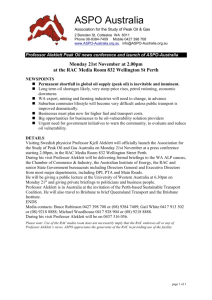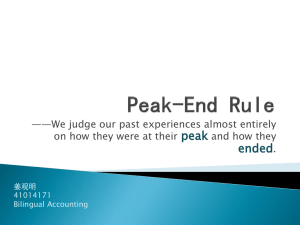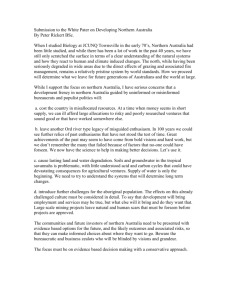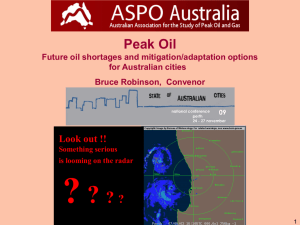About ASPO - The Association for the Study of Peak Oil and Gas
advertisement
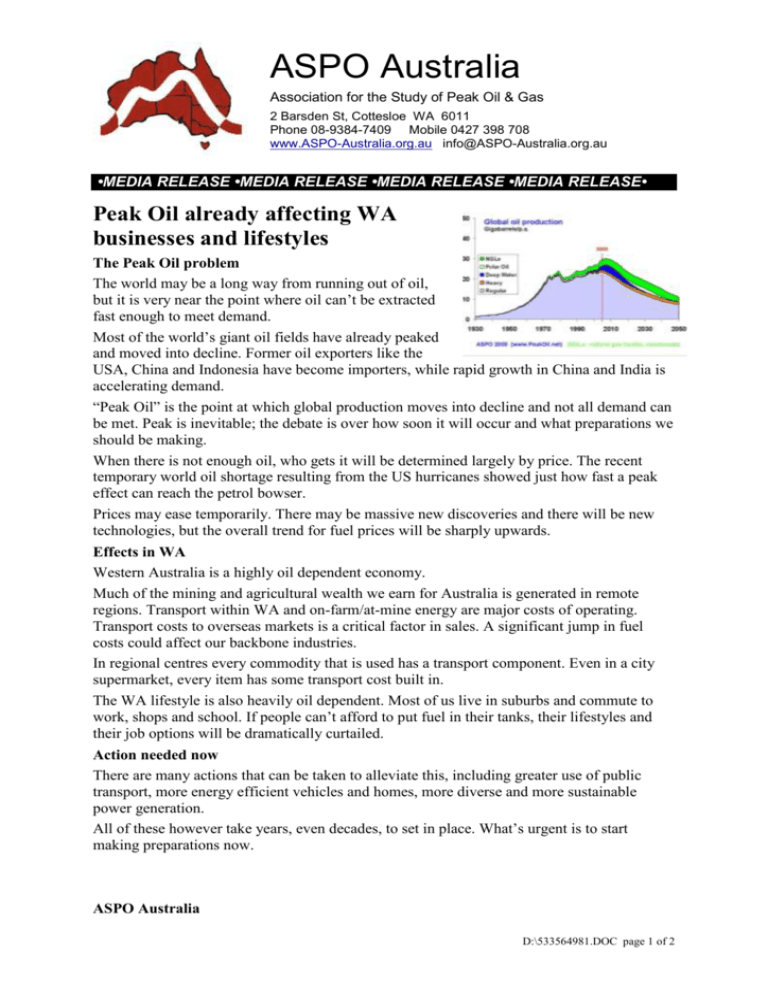
ASPO Australia Association for the Study of Peak Oil & Gas 2 Barsden St, Cottesloe WA 6011 Phone 08-9384-7409 Mobile 0427 398 708 www.ASPO-Australia.org.au info@ASPO-Australia.org.au •MEDIA RELEASE •MEDIA RELEASE •MEDIA RELEASE •MEDIA RELEASE• Peak Oil already affecting WA businesses and lifestyles The Peak Oil problem The world may be a long way from running out of oil, but it is very near the point where oil can’t be extracted fast enough to meet demand. Most of the world’s giant oil fields have already peaked and moved into decline. Former oil exporters like the USA, China and Indonesia have become importers, while rapid growth in China and India is accelerating demand. “Peak Oil” is the point at which global production moves into decline and not all demand can be met. Peak is inevitable; the debate is over how soon it will occur and what preparations we should be making. When there is not enough oil, who gets it will be determined largely by price. The recent temporary world oil shortage resulting from the US hurricanes showed just how fast a peak effect can reach the petrol bowser. Prices may ease temporarily. There may be massive new discoveries and there will be new technologies, but the overall trend for fuel prices will be sharply upwards. Effects in WA Western Australia is a highly oil dependent economy. Much of the mining and agricultural wealth we earn for Australia is generated in remote regions. Transport within WA and on-farm/at-mine energy are major costs of operating. Transport costs to overseas markets is a critical factor in sales. A significant jump in fuel costs could affect our backbone industries. In regional centres every commodity that is used has a transport component. Even in a city supermarket, every item has some transport cost built in. The WA lifestyle is also heavily oil dependent. Most of us live in suburbs and commute to work, shops and school. If people can’t afford to put fuel in their tanks, their lifestyles and their job options will be dramatically curtailed. Action needed now There are many actions that can be taken to alleviate this, including greater use of public transport, more energy efficient vehicles and homes, more diverse and more sustainable power generation. All of these however take years, even decades, to set in place. What’s urgent is to start making preparations now. ASPO Australia D:\533564981.DOC page 1 of 2 Visiting Swedish physicist Professor Kjell Aleklett will officially launch the Association for the Study of Peak Oil and Gas Australia on Monday 21st November at a press conference starting 2.00pm, in the RAC Media Room 832 Wellington Street Perth. The Association for the Study of Peak Oil & Gas Australia is part of an international network of scientists working to determine the date and impact of the peak and decline of the world’s production of oil and gas, due to resource constraints. ASPO Australia will: encourage further study of peak oil particularly as it affects Australia be a source of independent information for businesses, governments and communities wanting to assess and plan for likely impacts on them recommend policies to prepare for and reduce the impact of peak oil promote awareness of the issue of peak oil and gas, so individuals, industry sectors and communities can evaluate and reduce their oil vulnerability. During his visit Professor Aleklett will be delivering formal briefings to the WA ALP caucus, the Chamber of Commerce & Industry, the Australian Institute of Energy, the RAC and senior State Government bureaucrats including Directors General and Executive Directors from most major departments, including DPI, PTA and Main Roads. He will be giving a free public lecture at the University of Western Australia on Monday 21st November. The Australian Institute of Energy luncheon on Wednesday 23rd is also open to the public. Professor Aleklett is in Australia at the invitation of the Perth-based Sustainable Transport Coalition. He will also travel to Brisbane to brief Queensland Transport and the Brisbane Institute. ENDS Media Kit Available A comprehensive media kit with over 20 resource articles plus succinct summaries and graphics is available on CD, on request. Media contacts Bruce Robinson (ASPO Australia Convenor) 0427 398 708 or (08) 9384 7409 Gail White 0417 913 302 or (08) 9218 8888; Michael Woodhouse 0417 928 904 or (08) 9218 8888 or email michael@glidestrategic.com.au (for media kits) During his visit Professor Aleklett will be on 0437 316 056 D:\533564981.doc page 2 of 2
